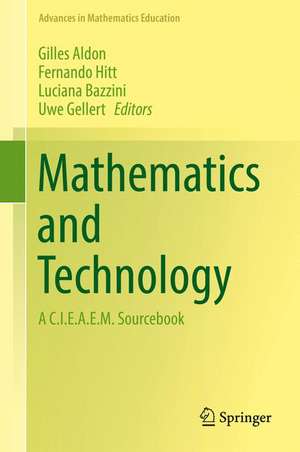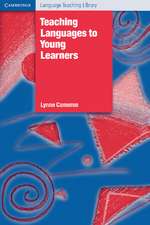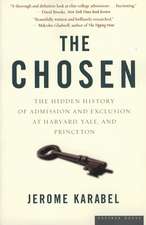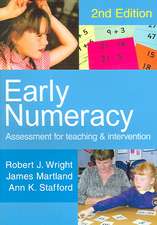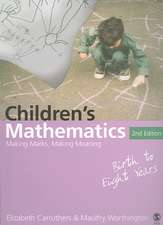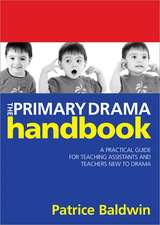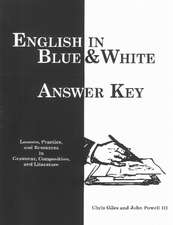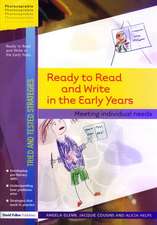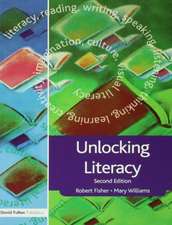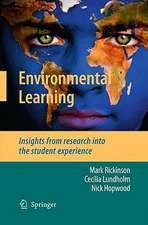Mathematics and Technology: A C.I.E.A.E.M. Sourcebook: Advances in Mathematics Education
Editat de Gilles Aldon, Fernando Hitt, Luciana Bazzini, Uwe Gellerten Limba Engleză Hardback – 13 apr 2017
The book continues a series of sourcebooks edited by CIEAEM, the Commission Internationale pour l’Étude et l’Amélioration de l’Enseignement des Mathématiques / International Commission for the Study and Improvement of Mathematics Education.
| Toate formatele și edițiile | Preț | Express |
|---|---|---|
| Paperback (1) | 1018.25 lei 6-8 săpt. | |
| Springer International Publishing – 18 iul 2018 | 1018.25 lei 6-8 săpt. | |
| Hardback (1) | 1024.53 lei 6-8 săpt. | |
| Springer International Publishing – 13 apr 2017 | 1024.53 lei 6-8 săpt. |
Din seria Advances in Mathematics Education
- 15%
 Preț: 648.24 lei
Preț: 648.24 lei - 18%
 Preț: 905.06 lei
Preț: 905.06 lei - 15%
 Preț: 660.04 lei
Preț: 660.04 lei - 18%
 Preț: 959.98 lei
Preț: 959.98 lei - 15%
 Preț: 642.51 lei
Preț: 642.51 lei - 15%
 Preț: 661.97 lei
Preț: 661.97 lei - 15%
 Preț: 657.57 lei
Preț: 657.57 lei - 24%
 Preț: 1337.45 lei
Preț: 1337.45 lei - 20%
 Preț: 581.64 lei
Preț: 581.64 lei - 15%
 Preț: 665.58 lei
Preț: 665.58 lei - 15%
 Preț: 653.14 lei
Preț: 653.14 lei - 24%
 Preț: 647.52 lei
Preț: 647.52 lei - 18%
 Preț: 1127.28 lei
Preț: 1127.28 lei - 18%
 Preț: 1129.02 lei
Preț: 1129.02 lei - 15%
 Preț: 656.89 lei
Preț: 656.89 lei - 18%
 Preț: 786.04 lei
Preț: 786.04 lei - 15%
 Preț: 656.43 lei
Preț: 656.43 lei - 18%
 Preț: 1134.06 lei
Preț: 1134.06 lei - 24%
 Preț: 842.56 lei
Preț: 842.56 lei - 18%
 Preț: 898.26 lei
Preț: 898.26 lei - 18%
 Preț: 957.62 lei
Preț: 957.62 lei - 24%
 Preț: 991.36 lei
Preț: 991.36 lei - 18%
 Preț: 950.33 lei
Preț: 950.33 lei - 18%
 Preț: 1009.54 lei
Preț: 1009.54 lei - 18%
 Preț: 1013.96 lei
Preț: 1013.96 lei - 24%
 Preț: 790.70 lei
Preț: 790.70 lei - 24%
 Preț: 797.37 lei
Preț: 797.37 lei
Preț: 1024.53 lei
Preț vechi: 1249.43 lei
-18% Nou
Puncte Express: 1537
Preț estimativ în valută:
196.04€ • 205.23$ • 162.21£
196.04€ • 205.23$ • 162.21£
Carte tipărită la comandă
Livrare economică 05-19 aprilie
Preluare comenzi: 021 569.72.76
Specificații
ISBN-13: 9783319513782
ISBN-10: 3319513788
Pagini: 661
Ilustrații: VII, 693 p. 344 illus.
Dimensiuni: 155 x 235 x 38 mm
Greutate: 1.15 kg
Ediția:1st ed. 2017
Editura: Springer International Publishing
Colecția Springer
Seria Advances in Mathematics Education
Locul publicării:Cham, Switzerland
ISBN-10: 3319513788
Pagini: 661
Ilustrații: VII, 693 p. 344 illus.
Dimensiuni: 155 x 235 x 38 mm
Greutate: 1.15 kg
Ediția:1st ed. 2017
Editura: Springer International Publishing
Colecția Springer
Seria Advances in Mathematics Education
Locul publicării:Cham, Switzerland
Cuprins
Introduction, Fernando Hitt.- Part 1 Technology, a Tool for Teaching and Learning Mathematics: A. Teaching.- Early child spatial development: A teaching experiment with programmable robots, Cristina Sabena.- Mediation of technological resources in lessons on polyhedra: Analysis of two teaching actions, Nielce Meneguelo Lobo da Costa, Maria Celia Pimentel de Carvalho, and Tania Maria Mendonça Campos.- Task design in a paper and pencil and technological environment to promote inclusive learning: An example with polygonal numbers, Fernando Hitt, Mireille Saboya, and Carlos Cortés.- ICT and liminal performative space for Hyperbolic Geometry’s teaching, Panagiota Kotarinou and Charoula Stathopoulou.- Improving the teaching of mathematics with the use of technology: A Commentary, Sixto Romero.- Part 2 Technology, a Tool for Teaching and Learning Mathematics: B. Learning.- Domains of manipulation in touchscreen devices and some didactic, cognitive and epistemological implications for improving geometric thinking, Marcelo Bairral, Ferdinando Arzarello, and Alexandre Assis.- Graphs in primary school: Playing with technology, Daniela Ferrarello.- Pocket calculators as an experimental milieu: Emblematic tasks and activities, Ruhal Floris.- The street lamp problem: Technologies and meaningful situations in class, Elisa Gentile and Monica Mattei.- A framework for failed proving processes in a Dynamic Geometry Environment, Madona Chartouny, Iman Osta, and Nawal Abou Raad.- Disclosing the “ræmotionality” of a mathematics teacher using technology in her classroom activity, Marina De Simone.- Integrating arithmetic and algebra in a collaborative learning and computational environment using ACODESA, Fernando Hitt, Carlos Cortés, and Mireille Saboya.- L-system fractals as geometric patterns: A case study, Anna Alfieri.- Learning and technology? Technology and learning? A commentary, Peter Appelbaum.- Part 3: Communication and Information: A. Communication Inside and Outside the Classroom.- E-mathematics engineering for effective learning, Giovannina Albano.- Learning paths and teaching bridges: The emergent mathematics classroom within the open system of a globalised virtual social network, Andreas Moutsios-Rentzos, François Kalavasis, and Emmanouil Sofos.- E-collaborative forums as mediators when solving algebraic problems, M. Pilar Royo, César Coll, and Joaquin Giménez.- Part 4: Communication and Information: B. Information’s Tools, to Inform Oneself and to Inform Others.- Problems promoting the devolution of the process of mathematisation: An example in number theory and a realistic fiction, Gilles Aldon, Viviane Durand-Guerrier, and Benoit Ray.- A classroom activity to work with real data and diverse strategies in order to build models with the help of the computer, Marta Ginovart.- Communication inside and outside the classroom: A commentary, Corinne Hahn.- Part 5: Technology and Teachers’ Professional Development.- A study on statistical technological and pedagogical content knowledge on an innovative course on quantitative research methods, Ana Serradó Bayés, Maria Meletiou-Mavrotheris, and Efi Paparistodemou.- The professional development of mathematics teachers: Generality and specificity, Maria Polo.- Integration of digital technologies in mathematics teacher education: The reconstruction processes of previous trigonometrical knowledge, Nielce Meneguelo Lobo da Costa, Maria Elisa Esteves Lopes Galvão, and Maria Elisabette Brisola Brito Prado.- Formative assessment and technology: Reflections developed through the collaboration between teachers and researchers, Gilles Aldon, Annalisa Cusi, Francesca Morselli, Monica Panero, and Cristina Sabena.- Teaching intriguing geometric loci with DGS, Daniela Ferrarello, Maria Flavia Mammana, Mario Pennisi, and Eugenia Taranto.- Technology and teachers’ professional development: A commentary, Gail E. FitzSimons.- Conclusion, Gilles Aldon.
Recenzii
“Mathematics and Technology … does an impressive job of presenting mathematical tasks in which technology serves as an important tool to facilitate student learning and engage them in mathematics. … A commentary at the end of each section summarizes the chapters and provides new insights that are consistent with the spirit of the book. … this book offers a great deal of information and insight concerning the aforementioned needs for technologybased mathematics education.” (Woong Lim, MAA Reviews, October, 2017)
Notă biografică
Dr. Gilles Aldon is a mathematics teacher and researcher at the Ecole Normale Supérieure de Lyon. He is particularly involved in research on problem solving linked with the integration of new technologies in the classroom. His Phd focuses on the use of technology in the regular classroom of mathematics, seeking to understand how the incidents are indicative of perturbations that change the dynamic of the class. His research focuses:
- on the links between problem solving and the actual use of technology in the classroom,
- on the possibilities of multi-representations given by technology and the links with teaching and learning,
- on the role of technology in assessment and particularly formative assessment.
Fernando Hitt is a Professor of Mathematics Education in the mathematics department of the Faculty of Sciences at the Université du Québec à Montréal, Québec, Canada. His research interests are related to the notion of epistemologicalobstacles in the learning of mathematics and the use of technology in mathematics education. He is currently a member of the Commission Internationale pour l’Étude et l’Amélioration de l’Enseignement des Mathématiques (CIEAEM).
Luciana Bazzini is professor emeritus of Mathematics Education at the University of Torino (Italy). Since the Seventies she has been doing research in Algebraic Thinking, Curriculum development in primary education and Teacher training, with the main purpose of bridging theoretical issues and school practice. She published books and papers on scientific journals and played active role in many international conferences. She acted as Secretary of CIEAEM (1998-2003) and Vice President (since 2013).
Uwe Gellert is a Professor of Mathematics Education in the Faculty of Education and Psychology at the Freie Universität, Berlin. His research interests include social inequalities in mathematics education, cross-cultural studies, microanalysis of classroom interaction, sociological perspectives on mathematics, and mathematics teacher education. He is currently the President of the Commission Internationale pour l’Étude et l’Amélioration de l’Enseignement des Mathématiques (CIEAEM).
- on the links between problem solving and the actual use of technology in the classroom,
- on the possibilities of multi-representations given by technology and the links with teaching and learning,
- on the role of technology in assessment and particularly formative assessment.
Fernando Hitt is a Professor of Mathematics Education in the mathematics department of the Faculty of Sciences at the Université du Québec à Montréal, Québec, Canada. His research interests are related to the notion of epistemologicalobstacles in the learning of mathematics and the use of technology in mathematics education. He is currently a member of the Commission Internationale pour l’Étude et l’Amélioration de l’Enseignement des Mathématiques (CIEAEM).
Luciana Bazzini is professor emeritus of Mathematics Education at the University of Torino (Italy). Since the Seventies she has been doing research in Algebraic Thinking, Curriculum development in primary education and Teacher training, with the main purpose of bridging theoretical issues and school practice. She published books and papers on scientific journals and played active role in many international conferences. She acted as Secretary of CIEAEM (1998-2003) and Vice President (since 2013).
Uwe Gellert is a Professor of Mathematics Education in the Faculty of Education and Psychology at the Freie Universität, Berlin. His research interests include social inequalities in mathematics education, cross-cultural studies, microanalysis of classroom interaction, sociological perspectives on mathematics, and mathematics teacher education. He is currently the President of the Commission Internationale pour l’Étude et l’Amélioration de l’Enseignement des Mathématiques (CIEAEM).
Textul de pe ultima copertă
This volume collects most recent work on the role of technology in mathematics education. It offers fresh insight and understanding of the many ways in which technological resources can improve the teaching and learning of mathematics. The first section of the volume focuses on the question how a proposed mathematical task in a technological environment can influence the acquisition of knowledge and what elements are important to retain in the design of mathematical tasks in computing environments. The use of white smart boards, platforms as Moodle, tablets and smartphones have transformed the way we communicate both inside and outside the mathematics classroom. Therefore the second section discussed how to make efficient use of these resources in the classroom and beyond. The third section addresses how technology modifies the way information is transmitted and how mathematical education has to take into account the new ways of learning through connected networks as well as new ways of teaching. The last section is on the training of teachers in the digital era. The editors of this volume have selected papers from the proceedings of the 65th, 66th and 67th CIEAEM conference, and invited the correspondent authors to contribute to this volume by discussing one of the four important topics.
The book continues a series of sourcebooks edited by CIEAEM, the Commission Internationale pour l’Étude et l’Amélioration de l’Enseignement des Mathématiques / International Commission for the Study and Improvement of Mathematics Education.
Caracteristici
Discusses the importance of using technology in the learning and teaching of mathematical concepts Highlights the importance of digital and mobile communication both inside and outside the classroom Suggests strategies to convince mathematics teachers of the importance of the use of technological resources
